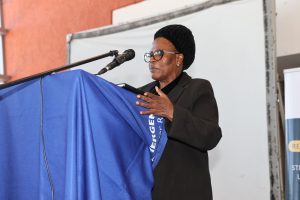 “Capricorn District Municipality is proud to co-host this workshop alongside our invaluable partners, the United Nations Office for Disaster Risk Reduction and GIZ – Resilience Initiative Africa (RIA). Your presence here, from various sectors and spheres of government, is a testament to the urgency and collective will needed to mainstream disaster risk reduction into urban planning and development,” said MMC for Community Services Cllr Elizabeth Rahlana.
“Capricorn District Municipality is proud to co-host this workshop alongside our invaluable partners, the United Nations Office for Disaster Risk Reduction and GIZ – Resilience Initiative Africa (RIA). Your presence here, from various sectors and spheres of government, is a testament to the urgency and collective will needed to mainstream disaster risk reduction into urban planning and development,” said MMC for Community Services Cllr Elizabeth Rahlana.Officiating the workshop, Rahlana said, “We are reminded time and again that disasters do not discriminate. Still, they disproportionately affect those who are least prepared, especially marginalised groups, the urban poor, and persons with disabilities.
Urban risk-informed development is not a choice it is a necessity. It requires that we design our cities and our expansion of villages with foresight, evidence, inclusivity, and a firm understanding of the risks our communities face.”
“Through this workshop, we aim to build capacity, share practical tools and experiences, and most importantly, develop concrete pathways to embed resilience into our urban development policies and strategies. The “Making Cities Resilient 2030″ initiative and the Sendai Framework are not just frameworks for disaster risk reduction they are blueprints for inclusive, future-proof development,” added Rahlana.
Rahlana was encouraged by the diverse representation in attendance included were government departments and municipalities to civil society, academia, and the private sector.
“Let us ensure that the discussions are not theoretical, but grounded in the real challenges and opportunities we face in the district and Polokwane city like ours,” concluded Rahlana.
 CDM Municipality
CDM Municipality




